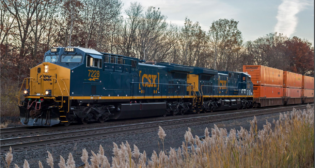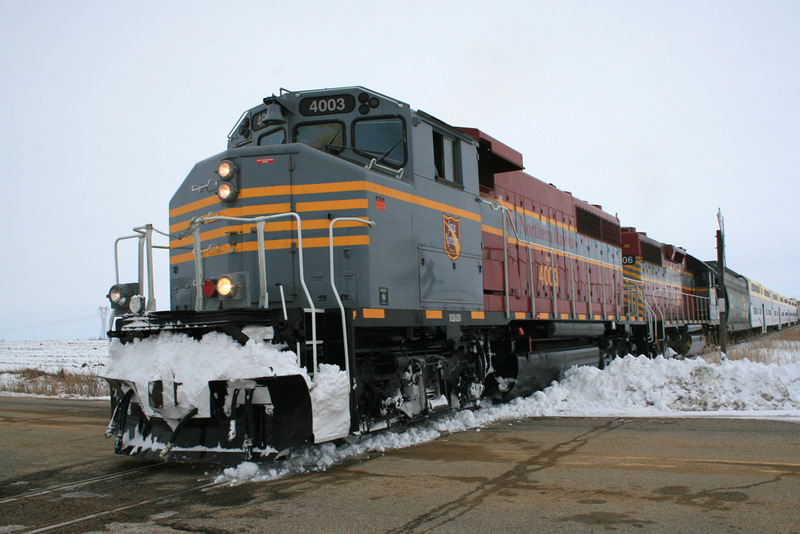
USDA, NGFA Weigh In on Proposed CN-IANR Combination
Written by Marybeth Luczak, Executive Editor
(IANR Photograph)
The U.S. Department of Agriculture (USDA) and the National Grain and Feed Association (NGFA) are recommending several conditions that the Surface Transportation Board (STB) consider if it approves CN’s application to acquire control of Iowa Northern Railway (IANR), the 275-mile U.S. regional that the Class I interchanges with in Waterloo and Cedar Rapids.

IANR serves upper Midwest agricultural and industrial markets, hauling such commodities as biofuels and grain. According to the regional’s website, it handles more than 60,000 carloads per year. Established in 1984, IANR runs diagonally through Iowa northwest to southeast from Manly to Cedar Rapids, with branch lines from Waterloo to Oelwein and from Forest City to Belmond (see map above). When a group led by Daniel Sabin, a second-generation railroader and current Chairman, took over management in 1994, the regional handled 15,000 revenue cars annually and its average track speed was under 10 mph, according to IANR.
IANR also interchanges with Union Pacific (UP) at Manly; Canadian Pacific Kansas City (CPKC) at Nora Springs; and UP and Railway Age two-time Short Line of the Year honoree Cedar Rapids and Iowa City (to Iowa Interstate Railroad) at Cedar Rapids.
CN on Dec. 6, 2023, signed an acquisition agreement with IANR, which it said “represents a meaningful opportunity to support the growth of local business by creating single-line service to North American destinations, while preserving access to existing carrier options.” The transaction closed in January into an independent voting trust pending regulatory review by the STB. A decision is expected this year.
While USDA reported in its April 29 filing (download below) that it “does not take a stance on whether the Board should approve” the proposed merger and “appreciates the Applicants’ commitment to maintain existing gateways on commercially reasonable terms, USDA does have concerns … especially related to service levels and rates for small and medium-sized shippers.”
That’s why it is proposing the following conditions for STB to consider if it approves the transaction:
- “[I]t is imperative to preserve IANR’s strengths of high-quality, low-cost, efficient service,” USDA reported. “Despite its relatively small size, IANR is significant to the nation’s agricultural economy. A ‘post-Staggers success’ story, the short line railroad has consistently grown rail traffic and prevented rail abandonments, and it built a loyal customer base among both small and large shippers over its 40-year history.” The railroad serves large shippers, including grain processing/ethanol facilities, as well as small- to medium-sized grain elevators. The Department is encouraging the STB “to consider IANR’s history and success when deciding what conditions to impose on the proposed transaction.” USDA noted that “benefits exist from the growth of shuttle train programs,” but it “believes small and medium elevators are still key elements of the grain supply chain and these shippers are entitled to rail service under the common carrier obligation.” It pointed out that IANR “plays a critical role in providing cost-effective and reliable rail service to about 20 grain elevators in Northeast Iowa.”
- The STB should “impose an oversight period of at least 5 years,” providing “concrete guidance on what it expects ‘commercially reasonable’ terms to entail over time”; maintaining “price transparency for IANR shippers,” including “requiring CNR [CN] to continue all public tariff documents for existing IANR routes” and “to provide shippers with written justification for any rate increase above the rate of inflation,” as a means of keeping “existing gateways open at commercially reasonable terms”; collecting “historical and future service metrics for all traffic on lines currently served by IANR,” such as origin dwell times, unfilled car orders, spot and pull fulfillment, carloadings, and the number of cars online; and including “a requirement that CNR give shippers the option to resolve [rate and service] disputes through arbitration.”
“Agricultural shippers depend on efficient rail transportation, and short line railroads play an important role in the rail transportation system—particularly for agricultural shippers,” USDA concluded. “USDA acknowledges that this transaction may benefit some agricultural shippers. However, the transaction may also negatively affect some agricultural shippers. It is important that, if the proposed transaction is approved, CNR should at least maintain the rates and service levels IANR has been providing to agriculture. With a combination of clear guidance on what is ‘commercially reasonable,’ transparent price and service data, and an arbitration mandate, USDA believes the proposed transaction could provide benefits to some shippers while protecting the quality service IANR has provided agricultural shippers in Northeast Iowa for decades.”
Meanwhile, in NGFA’s April 29 STB filing (download below), the association reported that it does not oppose the proposed acquisition. “However, the CN’s acquisition of IANR, a well-established and successful regional short line railroad that currently interchanges with CN, two other Class I railroads and a short line railroad in a relatively neutral fashion, would change the competitive balance in that region and beyond,” it wrote. “The absorption of IANR into CN will also alter the extent to which IANR currently provides local service to shippers on its … system, and its current means of addressing the specific issues of its customers. Moreover, nearly 20% of the IANR’s system is comprised of tracks it does not own, but over which the IANR has operating rights. These tracks are also located at existing interchange points, such as Cedar Rapids, IA and Cedar Falls, IA. The alteration or elimination of IANR’s existing rights as a result of this transaction could further impact the current competitive and operational circumstances. The NGFA submits that these and other aspects of the proposed transaction should cause it to be considered one of at least ‘regional significance,’ and it could even be of ‘national significance.’”
NGFA proposed the following conditions—similar to the USDA’s—should the STB approve the merger:
- “The Board should require the Applicants to adhere to the open gateway condition imposed by the Board in Docket No. FD 36500,” the CPKC merger approval. To facilitate such adherence and the STB’s enforcement of it, according to the association, the STB required during an oversight period “that Applicants provide to a shipper, upon request, a written justification for rate increases above the rate of inflation for interline movements subject to the open gateway obligation.” STB “also clarified that the gateway commitment applied to existing joint line movements, but also new shippers and new commodities that move via existing routings post-transaction” and “that the condition to keep gateways open on commercially reasonable terms applies both financially and operationally (physically)”; the STB also “directed CPKC to adhere to a binding arbitration process the applicants had proposed, subject to the alternative remedy of directly petitioning the Board for relief” and “imposed certain reporting requirements related to the open gateway commitment as part of its creation of a seven-year oversight period commencing upon its approval of the merger.” NGFA said STB “should endeavor to impose very similar, if not the same conditions it imposed on CPKC to CN and affirm its views in that case on what committing to keep gateways open on ‘commercially reasonable terms’ means.” Additionally, NGRA said, STB “should also hold CN to its representation that competition will be ‘markedly improved’ by its plan to maintain joint line options through the open gateway commitment.”
- “The Board should adopt a five-year oversight period and retain jurisdiction.” An oversight condition, NGFA reported, “has become a common part of nearly every substantive railroad acquisition under 49 U.S.C. §11325. In addition to being imposed on all ‘major’ transactions involving Class I railroads, five-year oversight periods have also been adopted for ‘significant’ and ‘minor’ transactions.” The association noted that a “key reason for adopting an oversight phase is to monitor the effects of the transaction on the aforementioned rights that IANR has to operate over the tracks of others, and agreements between the other involved railroads.” Oversight, it said, “is needed to monitor the extent to which these rights are altered or modified as a result of the changing competitive dynamic.”
- “The Board should oversee CN’s adoption of a scheduled local service plan.” While NGFA said that it appreciates CN’s pledge to support local service, the Class I “offers no details of how it—a Class I railroad focused on interline and single line cross country movements—is going to support and preserve the IANR’s local service. Instead, the Application contains general statements that ‘[t]he Transaction will ensure that customers on the Iowa Northern continue to receive safe, reliable local service, both for interline traffic bound for points beyond Iowa and for movements local to the Iowa Northern system’ … As to how this will happen, CN states ‘After gaining experience and familiarity with Iowa Northern’s local customers, CN would look to develop a scheduled local service plan to provide consistent and reliable service.’” Preservation of local service provided by IANR “is critical to the success of this transaction,” the association said.
- “Approval should be conditioned upon CN maintaining the status quo concerning IANR customer service issues.” CN in its application “represents that it plans to retain the IANR’s clerks, who in addition to their crew calling and dispatching duties perform customer service,” according to NGFA, which said it “applauds this plan.” However, “CN also states that it plans to ‘eventually’ integrate IANR’s clerks with CN’s clerks, without providing any specifics as to timing and process.” NGFA told the STB that “CN should be directed to supply more detail to the Board and stakeholders about its plans concerning this important aspect of the transaction, and that the Board should also impose a specific condition requiring CN to preserve, to the maximum extent possible, the status quo concerning customer service on the IANR system.” Additionally, during the oversight period STB “should closely monitor how CN integrates the IANR’s customer service into CN’s system and be prepared to step in and act to the extent CN’s actions result in the degradation of such service contrary to CN’s Application,” according to NGFA.
Further Reading
- STB Denies CPKC’s Petition Seeking Reconsideration of the Board’s Prior Decision to Classify CN’s Acquisition of Iowa Northern a “Minor Transaction”
- Shippers, Small Roads Weigh In on CN-IANR Merger Proposal



